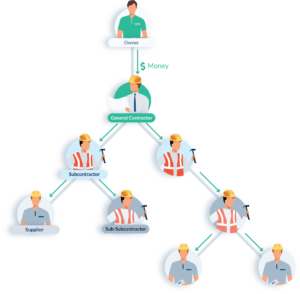
We know how it goes: You’ve got unpaid invoices stacking up on a single project. You ask your customer where the payments are only to find out that they haven’t been paid either. Since material suppliers are usually at or near the bottom of the payment chain, it’s hard to even know who you’re supposed to be mad at!
We don’t blame you if you feel like your position as a material supplier puts you at a disadvantage when it comes to getting paid on construction projects. But we have some information that may help. Keep reading to learn about the four things you’ll have to manage in order to get paid on all of the construction projects.
Four things you have to manage to get paid on all your construction projects
There are actually quite a few tools construction professionals can use to get paid on time on every project. But here are four of the most important things material suppliers need to know.
1. Know your state-specific lien and notice requirements
Raise your hand if you want to read the mechanics lien and notice requirements for every state you do business in. Anyone?
For those of you that don’t have time, the bottom line is this: Lien and notice requirements change on a state-by-state basis.
For example, this means that even though your material supply business might be located in, say, Georgia, if you ship materials to a project in Florida, then Florida’s lien and notice requirements are the rules that will be applicable, and not those of your home state.
Since material suppliers often do business in multiple states, complying with the various lien and notice requirements in all of the states where you do business can be a huge challenge.
We have information on mechanics lien laws for every state, including deadlines, notice requirements, and more. Our resources will guide you through everything you need to do to make sure your rights are protected.
Choose your state on the main mechanics lien page to see state-by-state requirements.
2. Keep track of lien and notice deadlines
While deadlines are an integral component of the lien and notice policy for every state nationwide, just like #1 above, each state enforces their lien and notice deadlines differently.
However, a missed notice or lien deadline can kill your lien rights no matter what state you’re doing business in. Take extra care to stay on top of your lien and notice deadlines as they pertain to your role in the project to make sure you don’t give up this remedy.
3. Know where to send your notices

If you’re a material supplier, then you’re probably at or near the bottom of a typical project “payment chain.”
That probably means two big things, both of which are not great:
- You typically get paid last
- Before the money to pay you actually gets to you, it has to flow through all of the other project participants that are above you in the payment chain.
Lien laws are set up to protect parties at the bottom of the chain from non-payment, but in order to send effective documents, you need to know the parties above you, especially the parties to whom you must send a preliminary notice.
This is not always easy, especially if you’re relying on piece-meal project information from a sales team spread throughout the country. Take extra care to find the property owner and GC on your projects so you can be sure your documents are getting in the right hands.
4. Manage your time wisely
Being familiar with lien rights management is one thing, having the time to deal with it is a whole different issue. In addition to collecting payment, you’re probably responsible for about 50 other things on a day to day basis.
From talking to thousands of people in the construction business, we know that making time to thoroughly and effectively manage lien rights is one of the biggest challenges in the industry. Lien rights management requires your time and attention, and unfortunately, this is not always easy to find.
